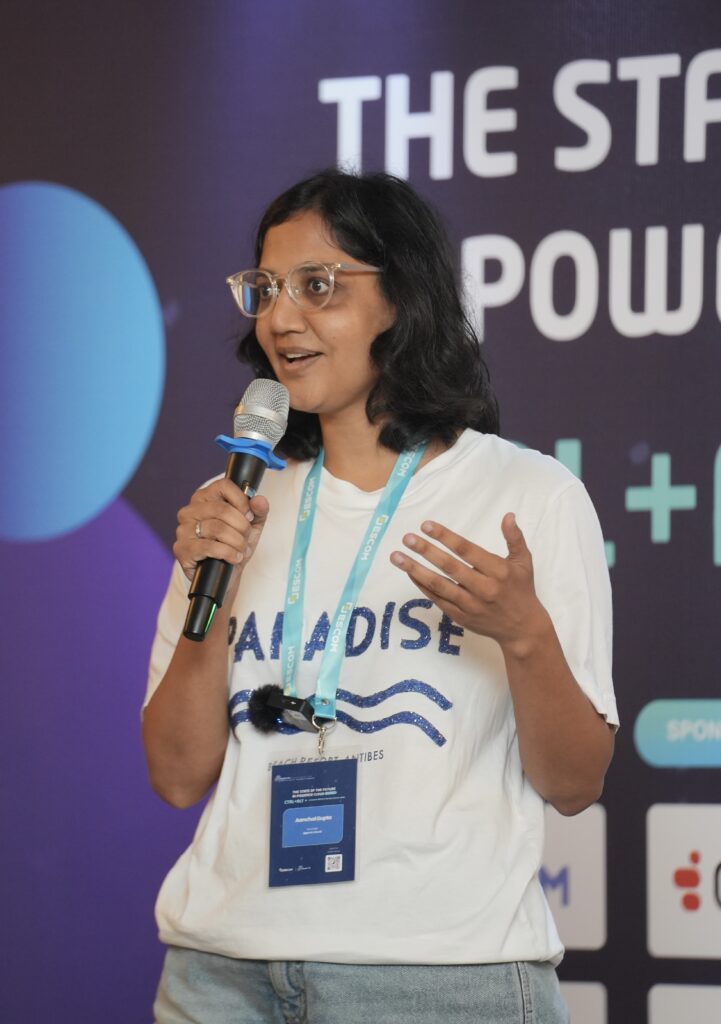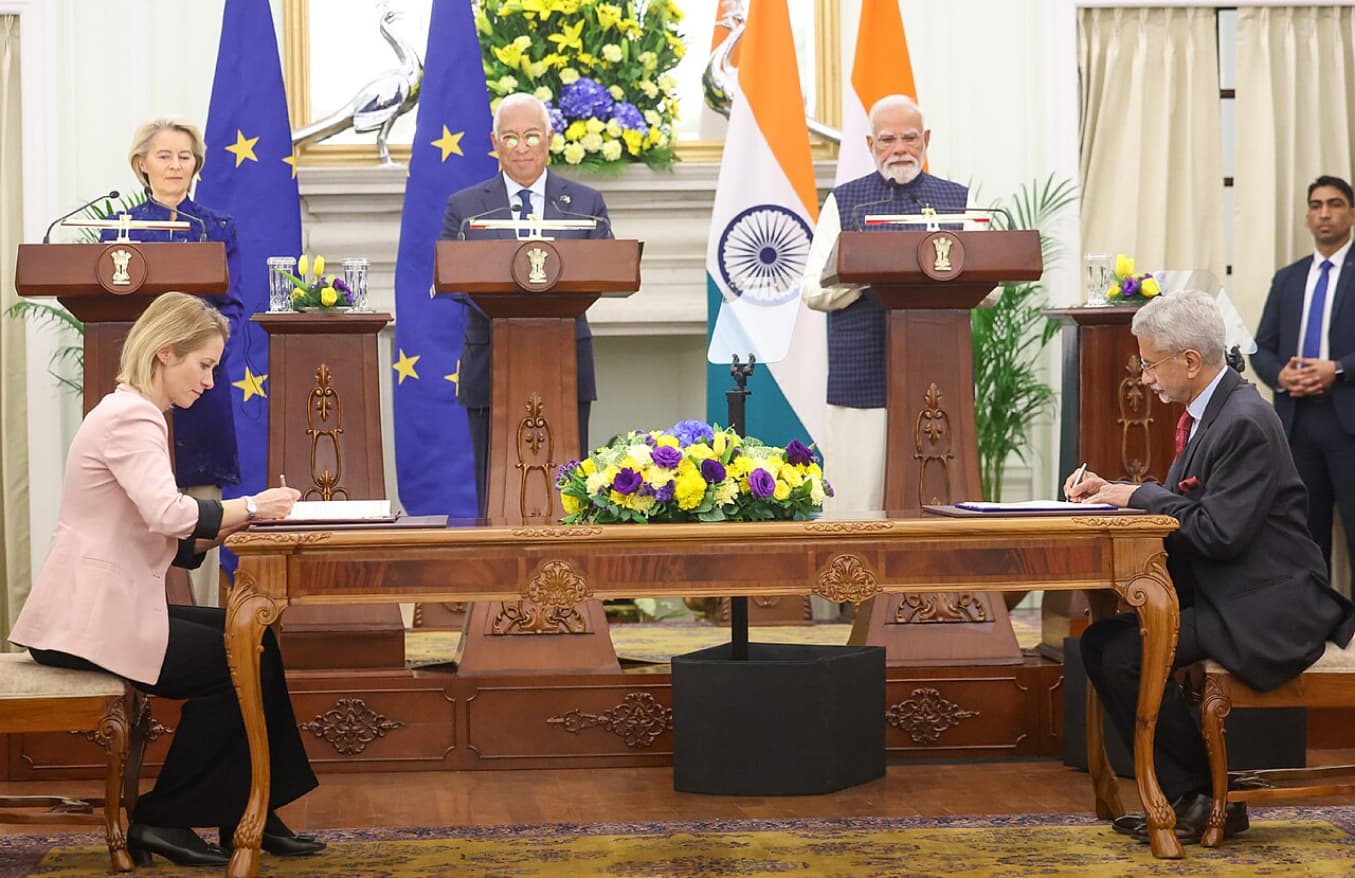In the rapidly evolving landscape where artificial intelligence meets environmental consciousness, few leaders possess the rare combination of technical acumen, business strategy expertise, and unwavering commitment to responsible innovation that defines true transformation architects. Aanchal Gupta stands as a testament to what emerges when deep technological understanding converges with environmental stewardship and the courage to build solutions from the ground up.


“Change Management is the biggest challenge in any organization to drive growth at pace, and with AI driving transformation at an ever-evolving pace, we need leaders who understand how to navigate this change with different stakeholders and also be mindful of the responsible use of AI.“
Her journey represents a masterclass in “zero to one” innovation, consistently identifying gaps in the market and building foundational solutions that reshape entire industries. From creating McKinsey’s first expert network in a simple Excel sheet to pioneering infrastructure cost optimization models and bringing cutting-edge cybersecurity products to Asian markets, Aanchal has demonstrated an exceptional ability to spot opportunities where others see challenges.
“The impact of right technology can be huge on how we live and connect, example the iPhone or WhatsApp that provided an interface for the world to come to one platform across cultures,” Aanchal reflects on her driving philosophy. “All my life I have worked with companies driving digital transformations with technologies solving a problem by design.”
This problem-solving mindset has been the cornerstone of her career, leading her through influential roles at McKinsey, Cloudflare, and now as the founder of Agents Stack, where she’s pioneering the integration of ESG principles into digital transformation through AI-powered solutions.
THE MAKING OF AN ARCHITECT OF CHANGE
What defines an “Architect of Change” in today’s complex business environment? According to Aanchal, it’s about understanding that transformation isn’t just about technology; it’s about people, processes, and responsible implementation at unprecedented scales.
“Change Management is the biggest challenge in any organization to drive growth at pace,” she explains. “With AI driving transformation at an ever-evolving pace, we need leaders who understand how to navigate this change with different stakeholders and also be mindful of the responsible use of AI, which would ideally lead to better ESG outcomes by design and proactive measures versus reactive actions.”
This perspective emerged from her extensive experience working across cultures and continents. Despite the geographical and cultural differences she encountered across APAC, EMEA, and Japan, Aanchal discovered a universal truth: “People are still the same at the core. Whether Japanese, Korean, Thai, African, Dutch, or Scottish, people want to see the impact of their work and they want things simplified to digest.”
Her approach to managing large-scale transformations reflects this human-centered philosophy. Rather than implementing sweeping changes that overwhelm organizations, she advocates for breaking down execution into smaller projects that drive continuous improvement. “The phases of the project should be in the order which needs minimum change management and can deliver good ROI still,” she notes, ensuring that teams remain engaged and outcomes remain visible throughout the transformation journey.
PIONEERING MOMENTS THAT SHAPED INDUSTRIES
Aanchal’s career has been marked by several defining moments where her initiatives fundamentally altered how organizations approach technology and operations. At McKinsey, what began as a simple Excel sheet tracking expert contacts evolved into the foundation of large-scale expert networks that continue to serve global consulting needs today.
Her infrastructure Total Cost of Ownership (TCO) models revolutionized how companies approach infrastructure management, moving beyond simple procurement decisions to comprehensive lifecycle cost analysis. This work laid the groundwork for more sustainable and efficient resource utilization across enterprises.
At Cloudflare, she took on the challenging role of bringing early-release products to market when they were “little baked,” as she puts it. Her work in shaping products for Asian markets, particularly in bot management, demonstrated her ability to identify regional needs and adapt global solutions accordingly.
These experiences reinforced her belief in the power of starting small and thinking big. “I have always been part of small organizations, mostly starting projects from zero to one,” she reflects, highlighting her preference for building foundational solutions rather than optimizing existing systems.
REDEFINING CYBERSECURITY IN THE AI ERA
As cyber threats evolve with artificial intelligence capabilities, Aanchal brings a pragmatic perspective to cybersecurity that cuts through industry hype to focus on fundamental principles. Her approach challenges conventional wisdom about tooling and complexity in favor of visibility and simplicity.
“People talk the most about tools and products, while cybersecurity is simplified the most when there is full data visibility and user awareness and training,” she observes. “Most attacks happen from the easiest doorway through phishing links and not sophisticated entry points.”
This insight leads to her counterintuitive recommendation: rationalize cybersecurity tools to just four to six essential solutions, rather than the 30 to 50 tools many multinational companies deploy today. “More simplified is the architecture, it’s easier to educate,” she explains.
Her vision for cybersecurity in the age of AI acknowledges both the threats and opportunities presented by artificial intelligence. “AI has made it super easy to drive attacks at scale, and it’s also helping to make defending easier,” she notes. The key lies in leveraging AI to automate mundane data tasks, freeing human experts to focus on preemptive actions and strategic decision-making.
For critical infrastructure, Aanchal advocates for a proactive approach centered on data visibility across networks and assets before pursuing digitization initiatives. This philosophy extends to her current work at Agents Stack, where cybersecurity is built into every digital transformation project through secure remote access, authentication, and network segregation.
ESG BY DESIGN, NOT BY AUDIT
Perhaps nowhere is Aanchal’s transformative thinking more evident than in her approach to Environmental, Social, and Governance (ESG) integration. While many organizations treat ESG as a compliance exercise, she envisions it as fundamental to business design and financial viability.
“ESG has been a very expensive affair purely because of the number of audits and the time spent in education of what’s ESG,” she observes. “Consulting and audit companies charge a lot, making it tougher for companies to balance it with their financial goals.”
Her solution through Agents Stack represents a paradigm shift: building ESG agents that enable real-time monitoring by providing affordable platforms that bring all relevant data together. The focus on user-friendly design ensures that SME users who might not be highly educated can still participate effectively in digitization efforts.
“Its important to make the tech affordable and user-friendly to make ESG by design and not an audit and consulting process consuming time and money,” she explains.
This approach addresses what she sees as the biggest opportunity for technology in advancing ESG goals: bringing together comprehensive data on “man, method, material, and machine” to provide full ecosystem visibility. For large companies managing thousands of suppliers across multiple tiers, this data visibility can address land and labor rights, biodiversity concerns, and resource efficiency across electricity, water, and fuel consumption.
RESPONSIBLE INNOVATION IN PRACTICE
Aanchal’s definition of responsible innovation emerges from her observation of the past decade’s technology boom, where rapid valuations often overshadowed genuine customer value creation. “A lot of innovation has been about competing and driving fast valuations of technology companies, while the value realized at customers has been low, and a lot of the innovation has created a divide in society on wealth,” she reflects.
Her framework for responsible innovation requires evaluating the economic and environmental impact of every use case before building products, particularly given the vast energy consumption of AI models and their ultimate climate impact.
This philosophy drives her current work in manufacturing digitization, where she focuses on frontline users and intuitive design to simplify change management. “People and process is 80% of the effort in digital transformations, while 20% is technology,” she notes. “If you make the technology simple to use with drag-and-drop interfaces, the effort is reduced on its own.”
THE POWER OF MENTORSHIP AND CONTINUOUS LEARNING
Despite her impressive track record of building solutions from scratch, Aanchal remains humble about her journey and emphasizes the critical role of mentorship in leadership development. “I wish I had more mentors; I still think I need more mentors,” she admits. “Every advice I have got at every step from mentors unlocked problems that would have taken me years to figure out.”
Her experience as often “the youngest and only woman in most of my roles in very traditional companies” shaped her understanding of the challenges faced by underrepresented groups in technology leadership. This personal experience now informs her mentoring philosophy with emerging leaders interested in the intersection of technology, ESG, and impact.
“I meet people every day who only show interest in Agents Stack as they like the focus on ESG, and in the discussions, even though they have had no prior experience on ESG, they start sharing examples of how in their current work they can bring in sustainability by design,” she observes. This organic emergence of ESG thinking gives her confidence that sustainable business practices can become natural when combined with the right technology and leadership.
MEASURING SUCCESS BEYOND TRADITIONAL METRICS
Aanchal’s approach to measuring transformation success centers on two core principles: efficiency and governance. Rather than getting lost in complex KPI frameworks, she focuses on tangible efficiency gains and simplified governance structures that emerge from well-designed digital transformations.
“Data is the essence of any transformation or innovation,” she explains. “Data coupled with experience is intuition, and intuitive decisions are mostly high impact.”
This data-driven approach, grounded in practical experience, enables her to make scalable decisions that create lasting impact across diverse market conditions and organizational structures.
BRIDGING STARTUP AGILITY WITH ENTERPRISE WISDOM
Her experience spanning both startups and Fortune 500 companies has given Aanchal unique insights into leadership approaches across different organizational contexts. She notes that startups “usually grow in a haphazard way in order to grow fast, especially if VC funded,” leading to challenges in hiring the right talent at each growth stage.
“The biggest challenge I saw with startup founders is having a blind eye to who fits the best at each stage of growth,” she observes. “Most end up hiring very experienced folks very early or not switching early enough to drive the right processes.”
Fortune 500 companies, she notes, have learned to balance experienced leadership with innovative thinking over time. This observation informs her current leadership philosophy, which emphasizes collaboration and challenging team members on responsible AI use while ensuring focus on solving the right problems.
A VISION FOR SYSTEMATIC CHANGE
Looking toward the future, Aanchal envisions systematic change driven by individual consciousness rather than top-down mandates. “If each one of us starts thinking the same way, the only thing to be identified is leadership skills, and ESG will come by design with right tech and impact,” she believes.
This grassroots approach to transformation aligns with her broader philosophy of building solutions that work for frontline users rather than imposing complex systems from above. Her work at Agents Stack represents this vision in action, creating tools that make sustainable practices accessible and profitable for organizations of all sizes.
As artificial intelligence continues to reshape industries and environmental concerns become increasingly urgent, leaders like Aanchal provide essential guidance on building technology that serves both business objectives and societal needs. Her journey from creating expert networks in Excel to pioneering AI-powered ESG solutions demonstrates that the most impactful transformations often begin with simple solutions to complex problems.
The future of business technology will be shaped by leaders who understand that true innovation requires balancing speed with responsibility, efficiency with equity, and growth with sustainability. Aanchal Gupta’s career provides a roadmap for achieving this balance, proving that responsible innovation isn’t just possible but profitable, and that the most sustainable transformations are those that put people and planet alongside profit.






